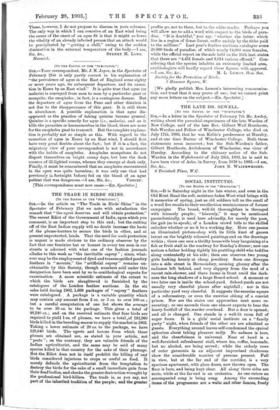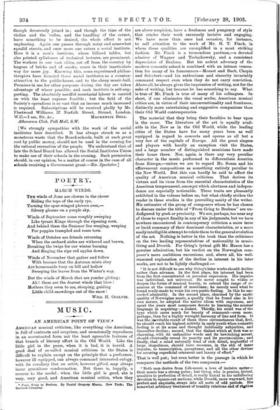SOCIAL INSTITUTES.
[To THE EDITOR OF THE "SPECTATOR.1 Sin,—It is Saturday night in the late winter, and even in the Old Kent Road the soft, moisture-laden West wind brings with it memories of spring, just as old soldiers tell us the smell of a wood fire recalls to their recollection reminiscences of former campaigns. The broad, well-lit thoroughfare is thronged with leisurely people ; " leisurely," it may be mentioned parenthetically, is used here advisedly, for merely the pace, the gait (so to speak), of a London crowd tells to the skilled onlooker whether or no it be a working day. Here one passes an illuminated picture-shop with its little knot of gazers intent on the brightly coloured paintings and on the drawings within ; there one sees a thrifty housewife busy bargaining at a fish or fruit stall in the roadway for Sunday's dinner; now one notices a father holding tightly his prattling child who toddles along contentedly at his side ; then one observes two young girls looking keenly at cheap jewellery. Soon one diverges into a side street in Bermondsey, seeming gloomy after the radiance left behind, and very slippery from the mud of a recent rain-shower, and there looms in front amid the dark- ness the long shadows of a large Board-school. A moment or two later one is inside the school-yard. School-yards are not usually very cheerful places after nightfall ; nor is this particular yard very cheerful. It suggests the exercise square of a reformatory, or even the exercise oblong of a convict prison. Nor are the stairs one approaches next more re- assuring ; as one ascends them one almost expects to hear the heavy footfall of the.warder overhead. But a door is opened; and all is changed. One stands in a well-lit room full of eager faces. It is a girls' social institute on a " family party" night, when friends of the other sex are admitted as guests. Everything around leaves self-condemned the cynical aphorism about taking pleasure sadly. No sadness is here, and the cheerfulness is universal. Near at hand is a well-furnished refreshment stall, where tea, coffee, lemonade, but no alcohol, are being served ; while the orderly rows of outer garments in an adjacent improvised cloakroom show the considerable number of persons present. Full in view, but at the far end of the corridor, is a very spacious apartment, with glass doors, now thrown open. The floor is bare, and being kept clear. All along three sides are seats, while at the far end is an orchestra. As one enters an accompanied song is being sung. Among the succeeding items of the programme are a waltz and other dances, freely
though decorously joined in ; and though the time of the violins and the 'cellos, and the handling of the cornet, leave something to be desired, the whole effect is not unpleasing. Again one passes through noisy and somewhat squalid streets, and once more one enters a social institute. Here it is a men's institute, where billiard tables, but also printed syllabuses of technical lectures, are prominent. The workers in our vast cities, cut off from the country by leagues of bricks and of smoke, crave in their inarticulate way for more joy. Knowing this, some experienced philan- thropists have founded these social institutes as a counter- attraction to the public-house, and to the cheap music-hall. Premises in use for other purposes during the day are taken advantage of where possible; and each institute is self-sup- porting. The absolutely needful secretarial labour is carried on with the least expense feasible ; but the field of the Society's operations is so vast that an income much increased is required. Subscriptions will be received gladly by Mr. Fleetwood Williams, 37 Norfolk Street, Strand, London,
W.C.—I am, Sir, &c., MACKENZIE BELL. Athenzum Club, Pall Mall, S.W.
[We strongly sympathise with the work of the social institutes here described. It has always struck us as a monstrous waste that the Board-schools, built at such great cost by public money, should not be used in the evening for the rational recreation of the people. We understand that of late the School Board has allowed the Social Institutes Union to make use of their schools in the evening. Such permission should, in our opinion, be a matter of course in the case of all schools receiving a Government grant.—ED. 'Spectator.]











































 Previous page
Previous page